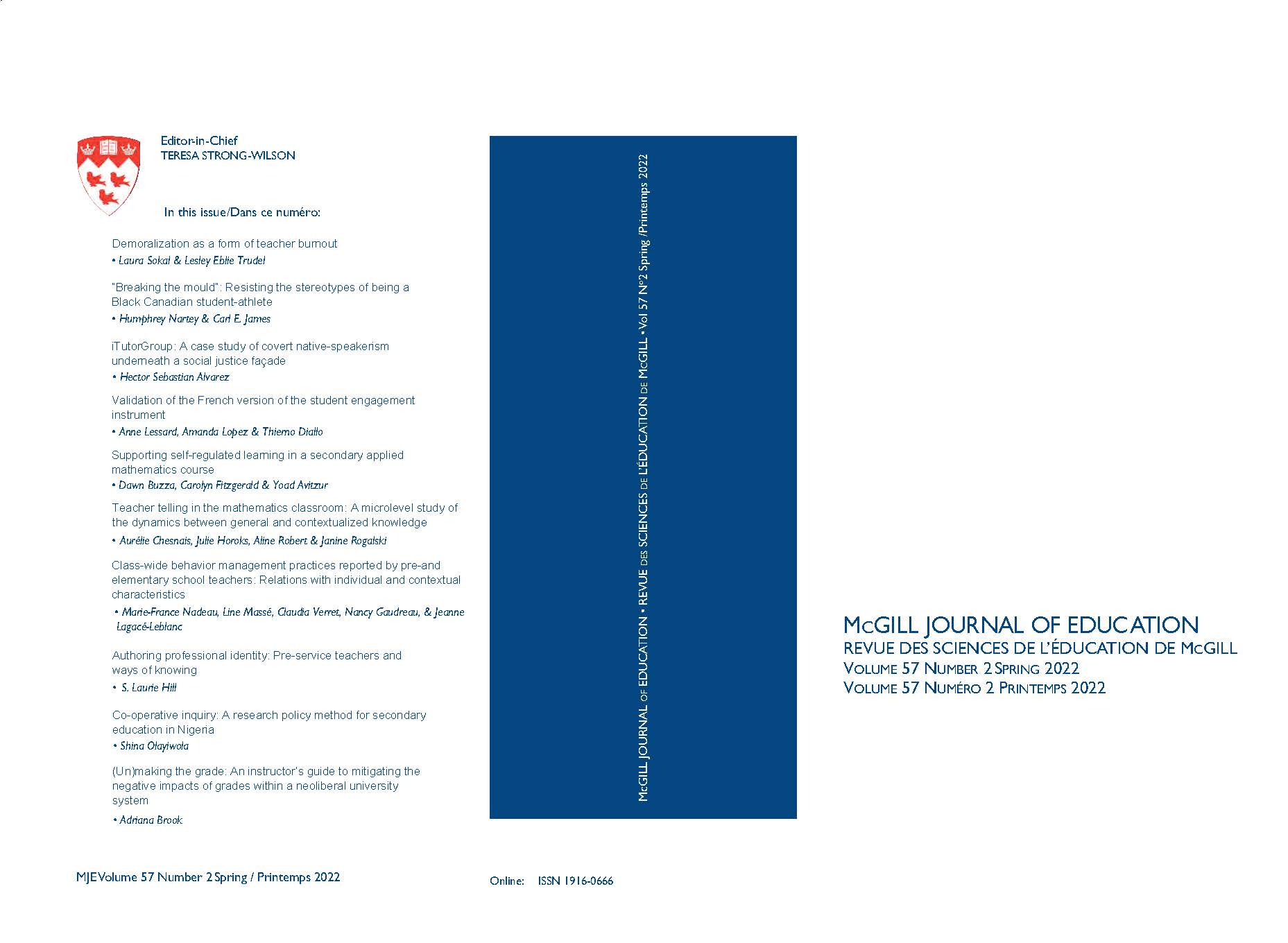Who am I, really? Reflections on developing professional identity as a Cégep teacher
Keywords:
cegep, college, teacher identity, apprenticeship of observation, community of practiceAbstract
In this MJE Forum, the author invites conversation on what it means to be a teacher in Quebec’s unique Cegep system. Cegep, positioned between the more structured secondary program and the more autonomous university experience, requires that its teachers grapple with what it means to be a Cegep teacher. Her own piece focuses on exploring her development as a teacher and how teacher identity is shaped by personal and professional relationships. Beyond professional development in workshops and continuing education, Cegep teachers engage in discussions, debates, and collaborations with our peers; ultimately, this community of practice is an essential element in the development of our teaching practice and our identity.
References
Avidov-Ungar, O., & Forkosh-Baruch, A. (2018). Professional identity of teacher educators in the digital era in light of demands of pedagogical innovation. Teaching and Teacher Education, 73, 183–191.
Badley, K., & Hollabaugh, J. (2012). Metaphors for teaching and learning. Faculty Publications—School of Education,52–67.
Belanger, D. (2007, Winter). Trois fois, passera... Vers un profil de competences unique de la professional enseignante? Pédagogie Collégiale, 20(2), 17–22.
Borg, M. (2004). The apprenticeship of observation. ELT Journal,58(3), 274–276. https://doi.org/10.1093/elt/58.3.274
Burgess, D. A. (1971). The English-Language CEGEP in Quebec. McGill Journal of Education, 6(001), 90–101.
Champlain College. (2020, September 21). General Social Science. Retrieved from https://www.champlainonline.com/champlainweb/future-students/general-option-in-social-science/
Danielewicz, J. (2001). Teaching selves: Identity, pedagogy, and teacher education. State University of New York Press.
Dawson College. (2021). Comprehensive Examination: Registrar. Retrieved from https://www.dawsoncollege.qc.ca/registrar/comprehensive-examination/
Dillard, A. (2013). The Writing Life. New York: Harper Perennial.
Doucet, S. (2016). In 2016, What is "A Good Teacher" Pédagogie Collégiale,29(5), 4–5.
Durocher, R. (2015). Quiet Revolution. Retrieved September 06, 2017, from http://www.thecanadianencyclopedia.ca/en/article/quiet-revolution/
Enyedy, N., Goldberg, J., & Welsh, K. M. (2005). Complex dilemmas of identity and practice. Science Education Sci. Ed.,90(1), 68–93.
Fearon, J. (1999, December). What Is Identity (As We Now Use the Word)? Retrieved July 21, 2016, from https://web.stanford.edu/group/fearon-research/cgi-bin/wordpress/wp-content/uploads/2013/10/What-is-Identity-as-we-now-use-the-word-.pdf
Fédération des cégeps. (2019, August 21). A few figures on CEGEPS. Retrieved from https://fedecegeps.ca/en
Flores, M. A., & Day, C. (2006). Contexts which shape and reshape new teachers’ identities: A multi-perspective study. Teaching and Teacher Education,22(2), 219–232.
FNEEQ (Fédération nationale des enseignantes et des enseignants du Québec). (2016). 2015-2020 Collective Agreement. Retrieved from https://fneeq.qc.ca/wp-content/uploads/2015-2020-Collective-agreement-FNEEQ-1.pdf
Fortier, I. (2007, Winter). One Teacher's Journey. Pédagogie Collégiale,20(2), 1–2.
Gauvreau, C. (2013, November 13). Le rapport Parent: Un document fondateur | UQAM. Retrieved May 20, 2019, from https://www.actualites.uqam.ca/2013/le-rapport-parent-un-document-fondateur
Gettysburg College. (2021). One third of your life is spent at work. Retrieved from https://www.gettysburg.edu/news/stories?id=79db7b34-630c-4f49-ad32-4ab9ea48e72b
Gini, A. (1998). Work, Identity and Self: How We Are Formed by the Work We Do. Journal of Business Ethics, 17(7), 707–714.
Izadinia, M. (2013, August). A review of research on student teachers’ professional identity. British Educational Research Journal,39(4), 694–713.
Lessard, C., & Brochu, É. (2012, April 10). Collège d'enseignement général et professionnel (CEGEP) in Quebec. Retrieved from https://www.thecanadianencyclopedia.ca/en/article/college-denseignement-general-et-professionnel-cegep
Lortie, D. C. (1975). Schoolteacher. Chicago, IL: University of Chicago Press.
Lortie, D. (2005). Unfinished Work: Reflections on Schoolteacher. In A. Lieberman (Ed.), The roots of educational change (pp. 133–150). New York: Springer.
Magnuson, R. (1986). A brief history of Quebec education: from New France to Parti Québécois. Montréal: Harvest House.
McDonnell, M. (2012). Rétroactions cohérentes dans une pédagogie constructiviste: Une analyse des rétroactions sur les travaux écrits dans les cours d’anglais aux cégeps anglophones = Consistent feedback for a constructivist pedagogy: A study of feedback on written assessments in Cégep English courses (Unpublished master's thesis). Université de Sherbrooke.
McDonnell, M. (2018, March 29). Tending the Community of Practice Garden. Retrieved from https://maggiemcd.edublogs.org/2018/03/29/tending-the-community-of-practice-garden/
McDonnell, M. (2020). Raisins in the dough: Conversations on teacher identity and assessment practices (Unpublished doctoral dissertation). McGill University.
Perron, J. (2011). Le cégep: plus que jamais synonyme d’enseignement supérieur! Les cégeps: 40 ans… et après ? Association des cadres des collèges du Québec, 5–12.
Pigeon, M. (n.d.). Education in Québec, before and after the Parent reform. Retrieved from http://collections.musee-mccord.qc.ca/scripts/explore.php?Lang=1&tableid=11&tablename=theme&elementid=107__true&contentlong.
Quebec, Ministère d'éducation et de l'enseignement supérieure. (2021). College Education. http://www.education.gouv.qc.ca/en/contenus-communs/enseignement-superieur/college-education/
Thornton, A. (2011). Being an Artist Teacher: A Liberating Identity? International Journal of Art & Design Education,30(1), 31–36.
Trautwein, C. (2018). Academics' identity development as teachers. Teaching in Higher Education, 23:8, 995–1010.
Weimer, M. (2016, October 05). Why We Teach: Exploring the Teacher-as-Midwife Metaphor. Retrieved October 06, 2016, from http://www.facultyfocus.com/articles/teaching-professor-blog/why-we-teach/?utm_campaign=Faculty Focus
Published
How to Cite
Issue
Section
License
Copyright (c) 2021 McGill Journal of Education / Revue des sciences de l'éducation de McGill

This work is licensed under a Creative Commons Attribution-NonCommercial-NoDerivatives 4.0 International License.



